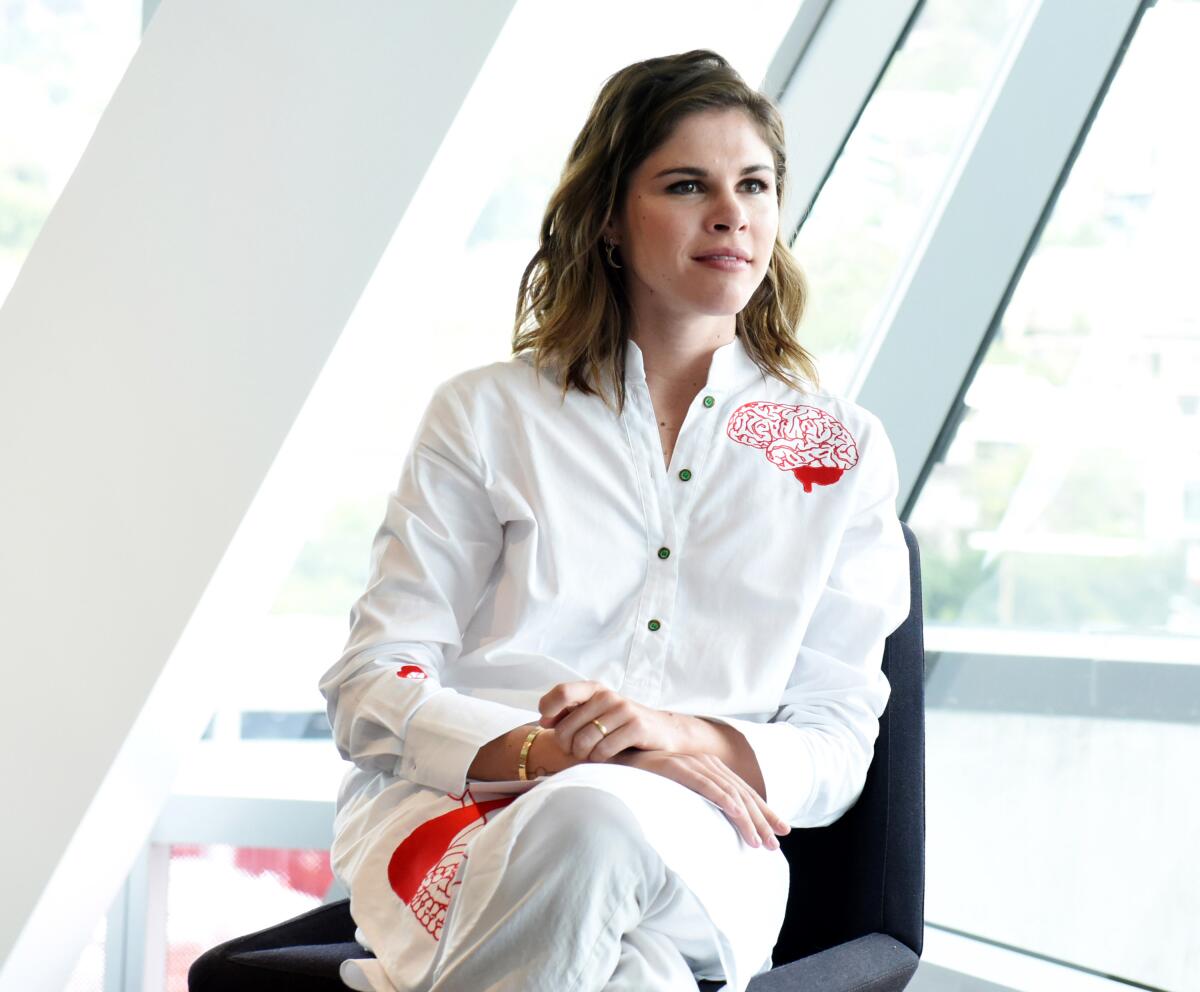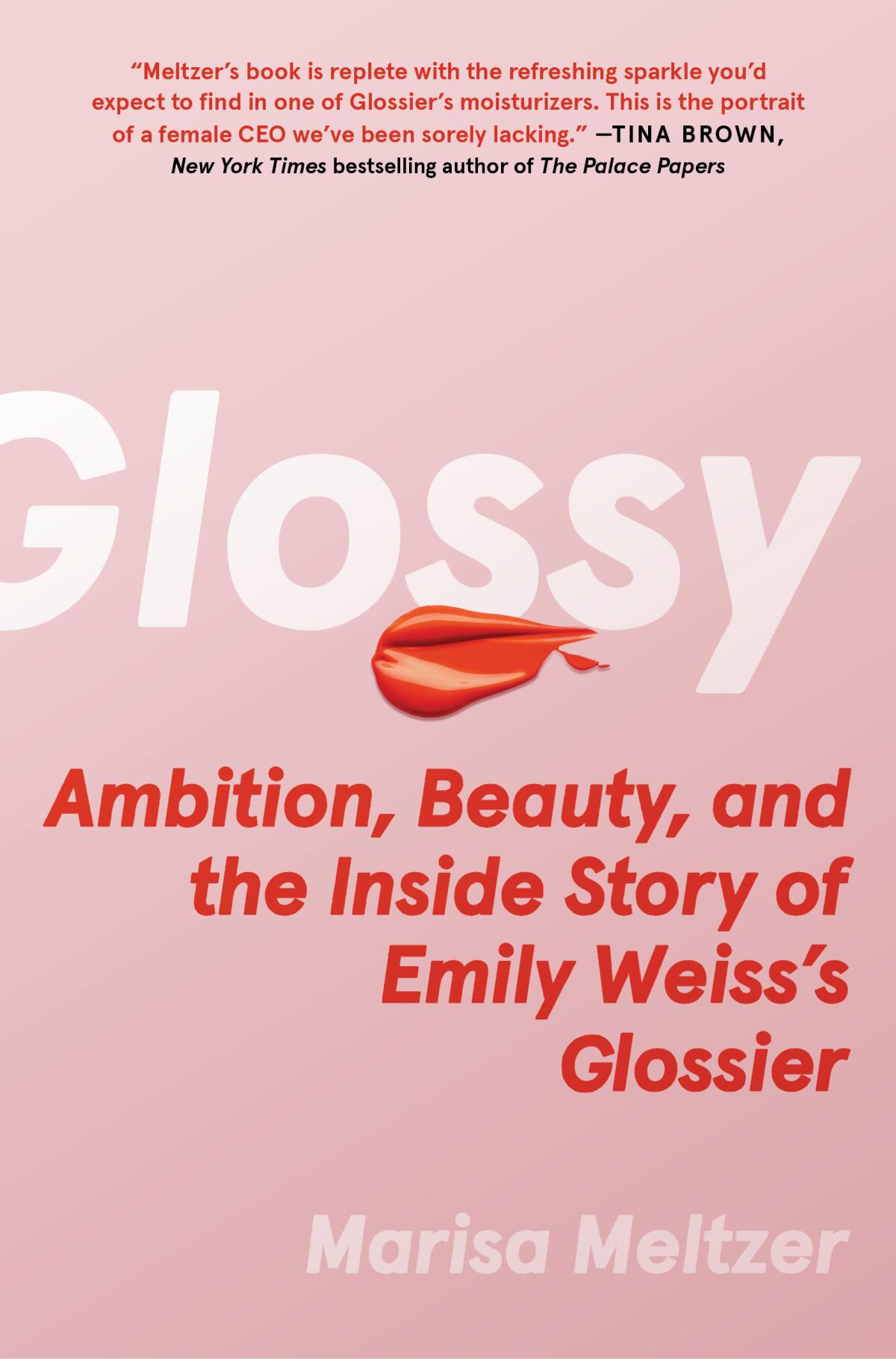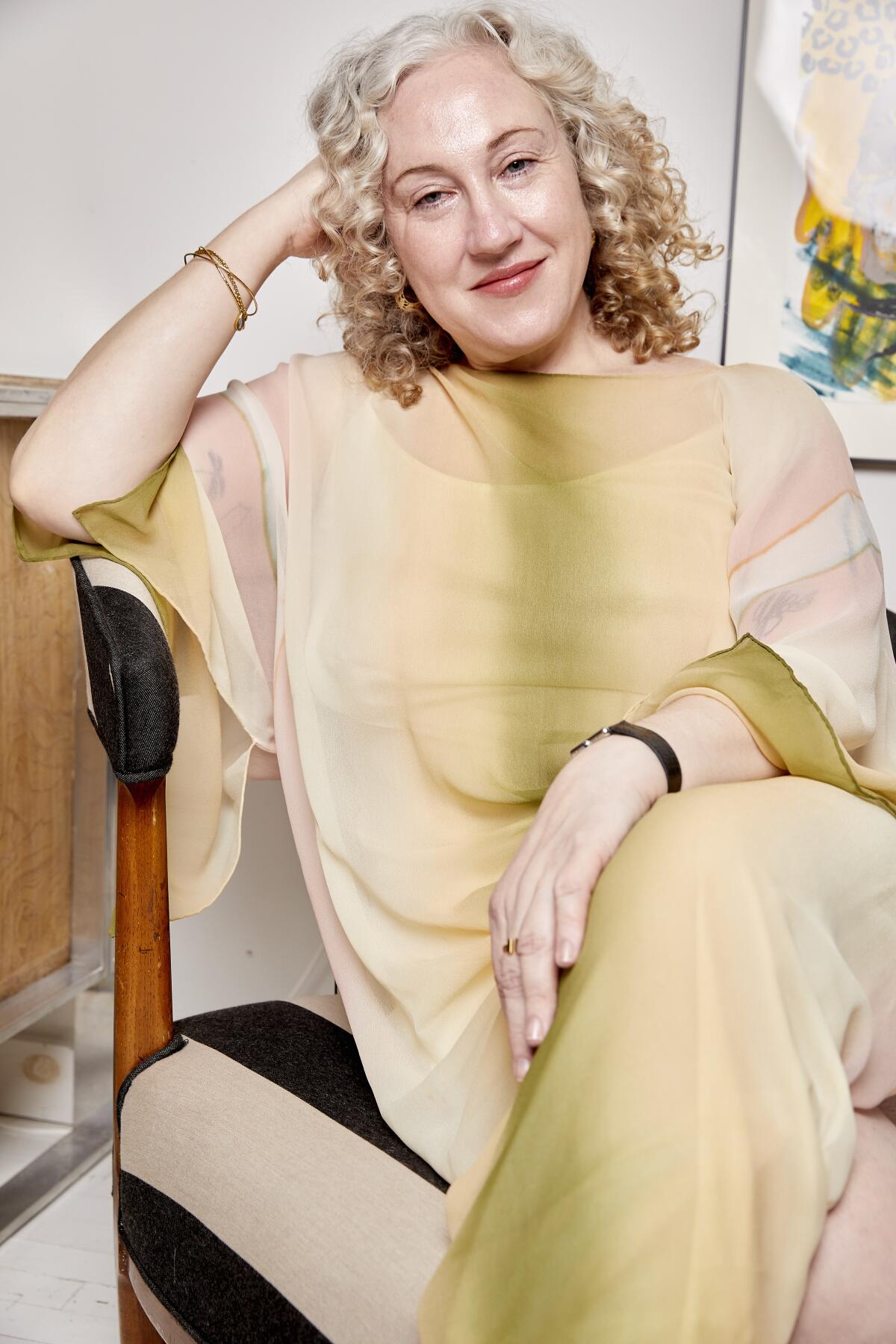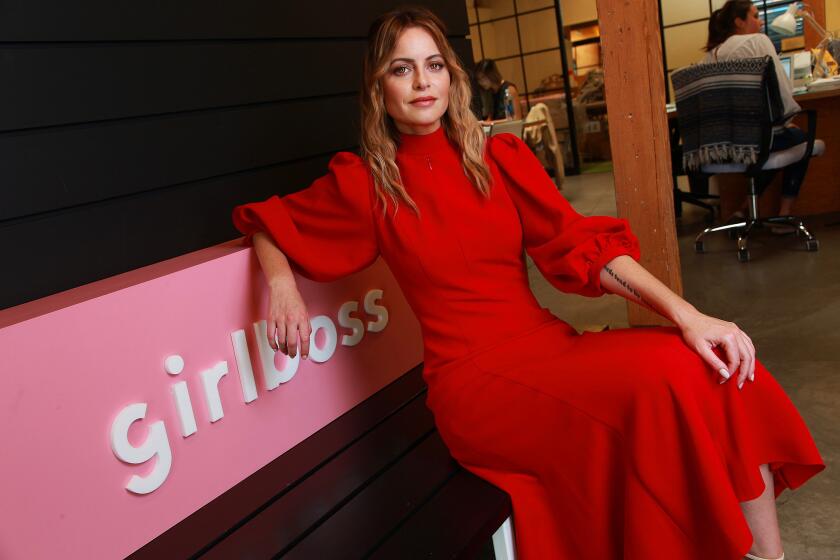How a history of Glossier became an epitaph for girlboss feminism

- Share via
On the Shelf
Glossy: Ambition, Beauty, and the Inside Story of Emily Weiss’s Glossier
By Marisa Meltzer
Atria: 304 pages, $29
If you buy books linked on our site, The Times may earn a commission from Bookshop.org, whose fees support independent bookstores.
Some millennials will remember waiting on the 10,000-person waiting list for their Boy Brow, or standing in the long queue outside the flagship store in Soho for their chance to be a Glossier girl. Founded in 2014 by Emily Weiss, former Teen Vogue intern and fan favorite on “The Hills,” the makeup brand for people who don’t need makeup went on to reach a staggering $1.2 billion dollar valuation in 2019.
In May 2022, Weiss stepped down as CEO. Glossier, once too cool for school, is now being sold at Sephora. A Google search returned the questions, “Why is Glossier not popular anymore?” and “Why is Glossier so famous?” Now there’s a book to explain it all. In “Glossy: Ambition, Beauty, and the Inside Story of Emily Weiss’s Glossier,” veteran beauty reporter and author Marisa Meltzer, who has written books on ‘90s girl bands, Weight Watchers and Sassy magazine, turns to the rise and possible plateau of the signature brand of the 2010s.
Meltzer spoke to The Times on a phone call from her home in Brooklyn about what the story of Glossier really means for commerce, feminism and the ultimate question: Is a “girlboss” a good witch or a bad witch?
Screenwriter Kay Cannon’s road to helming a Netflix comedy series all started a few years ago because a host of Oscar-nominated films left her ungratified.
Glossier started out as “Into the Gloss,” a widely successful beauty blog that featured articles from celebrities sharing their favorite products. I have to admit I was devastated when Emily launched Glossier—
Because you knew it was the end of ITG?
Yes! I still refresh the website hoping for more content.
Like you, I had read ITG from its inception and always thought the site was cooler than me but very readable. As someone who wrote about beauty, I was interested in how it canonized certain products like French girl pharmacy products, cult things you’d have to be a real beauty nerd to be into. Glossier was on my mind going into the pandemic, and I was bored and depressed. I was looking in the mirror and being like, “How bad does my hair look,” paired with the fact that we were all on Zoom. It was as if I had never seen my face before.

And this is where the book idea came from?
My original idea was broader, but the story of Glossier dwarfed the other narratives because it was everything I wanted to talk about: venture capital, girlbosses, changing aesthetics, beauty being as cool or cooler than fashion. And there was this woman at its center who was always a bit of a cipher, hard to pin down.
Weiss spoke with you several times but was less than forthcoming about her personal life. As a journalist, how do you balance that need for access with your mission to write the truth?
It is much easier to write about someone who is dead! It was not easy. I’m not Kitty Kelley; I’m not writing a sleazy biography, everything was based on reporting and facts and my own analysis. Emily has her job and her career that she wants to protect, but I also have a job, and it’s also valid. Glossier was not something I stumbled upon. Its success was not an accident, either.
Reckoning with the “girlboss” trope, feminist wars and much more, Rafia Zakaria’s “Against White Feminism” challenges notions of solidarity.
I appreciated reading about Weiss’ passion for Steve Jobs — she compared the first Glossier store to the Apple Store. I loved it when she said publicly, “My head of comms will kill me . . . But I think about it a little bit like, how are religions scaled?”
There’s something really thrilling about “sky’s the limit!” Could there be a Glossier hotel? She really wanted to make a bra! What can’t we do? That’s exciting. If that seemed remotely possible in my life, I’m sure I’d get caught up in that. It’s probably why I’m drawn to this story because it’s so unlike who I am.
You write that Weiss and her team seemed to see Glossier as a tech company.
Remember, “The Social Network” came out in 2010. I think it was caught up in that moment where being a tech company was sexier. I also think it is a bit of internalized misogyny. You know what’s more important than being a beauty company? Oh, being a tech mogul. Also when you have raised that amount of money, you’re constantly having to justify yourself, why you need all this money. It’s telling that the new CEO, Kyle Leahy, has clearly stated: We are a beauty company. We are absolutely not a tech company.
You mentioned Sophia Amoruso, the founder of clothing company Nasty Gal, who wrote a memoir in 2014 called “Girlboss.” In 2016, Nasty Gal filed for bankruptcy. “Girlboss” has since become almost an insult, with Amoruso, Audrey Gelman (the founder of the Wing) and even Weiss yoked to the meme: Gaslight, gatekeep, girlboss. Do these three women deserve to be grouped together under that mantra?
These companies definitely show the limits of inclusivity. They can literally write copy saying, “You can sit with us!” but if your retail employees are not being taken care of by their managers or they aren’t being protected ... there are these bosses that have no concept of their lives. All the branding can’t keep up with this. These days, people have plenty of opportunities to speak truth to their own experiences.
Sophia Amoruso, the 35-year-old “#Girlboss” author and businesswoman, dabbed her eyes, which were covered in a glittery eye shadow.
Have we hit the limit of white feminism here? You write in the book, in the case of the Wing: “It felt a bit like these companies were playing with the ideas of equity and advancement for women, which is not the same thing as doing it.”
Well, one of Glossier’s first products was a sheer coverage makeup for your face that only came in three shades. The Instagram account “outatthegloss” had real complaints and demands about the retail employees’ treatment by customers and by their managers. But allegations don’t have to mean automatic cancellation. They can bring a chance for change.

For instance, Glossier, in response to those experiences, launched an incubator program which has put their money where their mouth is in terms of inclusivity. This program has yielded companies like Golde, and the reports from the companies who have been funded are all good.
It’s important to be able to expose flaws in these corporations and businesses but we need to show a path forward. The employees of Glossier had a list of demands and it was actionable. To answer to the laborers about systematic racism. It can’t just be that problematic people get canceled and disappear.
I should also point out, as you do, that there is a massive double standard in how male and female CEOs are treated when they say brash or ridiculous things.
Part of the problem is that there are not as many female CEOs. And if you are a female CEO, you’re expected to prop up all women. And if you’re queer or a woman of color, forget it, the expectations and pressures are even higher. Women don’t have the length of rope that men have. Men are allowed to be rude, unapologetic, and they are allowed to make mistakes. Women just are not.
The latest from Ling Ma, Yiyun Li, Russell Banks and Namwali Serpell as well as exciting newcomers round out our critics’ most anticipated fall books.
What about Weiss, who had a child a month after stepping down from Glossier? Do you think she’s done with being an entrepreneur?
Gosh, no, I don’t think she’s done. She’s due for some rest and has her hands full with her baby, but I think she’ll be back. She was born with such a particular burning brand of drive and ambition, and those things don’t go away.
More to Read
Sign up for our Book Club newsletter
Get the latest news, events and more from the Los Angeles Times Book Club, and help us get L.A. reading and talking.
You may occasionally receive promotional content from the Los Angeles Times.










